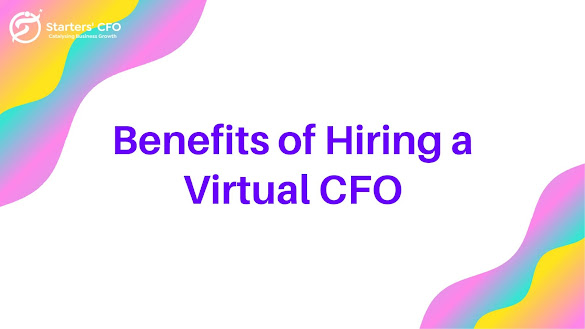The Rise of Virtual CFOs: How Technology is Transforming Financial Leadership
 SCFO
SCFO- Nov 20, 2024
- Virtual CFO Services
In today’s rapidly evolving business landscape, technology continues to redefine traditional roles and practices. One of the most significant transformations is the emergence of virtual CFO services in India Virtual CFOs (Chief Financial Officers). Leveraging technology, Virtual CFOs are revolutionizing financial leadership, offering businesses—especially small and medium enterprises (SMEs)—access to high-level financial expertise without the overhead costs associated with a full-time executive. Virtual CFO consultancyThis blog explores the rise of Virtual CFOs, the technology driving this change, and the impact on financial leadership.
The Traditional CFO Role
Traditionally, CFOs have been pivotal in managing a company’s finances, providing strategic financial guidance, and ensuring fiscal responsibility. They are responsible for financial planning, risk management, record-keeping, and financial reporting. However, hiring a full-time CFO is often costly, making it a luxury that many SMEs cannot afford. This gap in the market has paved the way for the rise of virtual CFO services and consultancy
What is a Virtual CFO?
A Virtual CFO is an outsourced service provider offering high-level financial expertise and strategic financial management to businesses on a part-time or project basis. Unlike traditional CFOs who are physically present in the office, Virtual CFOs work remotely, leveraging advanced technology to provide their services. This model allows businesses to access critical financial insights and leadership without the need for a full-time, on-site executive. Golden rules of accounting.
Technology Driving the Virtual CFO Revolution
Several technological advancements have facilitated the rise of Virtual CFOs:
- Cloud Computing: Cloud-based financial software allows Virtual CFOs to access financial data from anywhere, at any time. This accessibility ensures real-time financial analysis and reporting, enabling timely decision-making.
- Automation and AI: Automation tools and artificial intelligence (AI) streamline repetitive financial tasks such as bookkeeping, invoicing, and payroll processing. This efficiency allows Virtual CFOs to focus on strategic planning and analysis. accrual basis of accounting
- Communication Tools: Advanced communication platforms like Zoom, Slack, and Microsoft Teams facilitate seamless interaction between Virtual CFOs and their clients. These tools enable regular virtual meetings, ensuring continuous collaboration.
- Data Analytics: Sophisticated data analytics tools provide Virtual CFOs with deeper insights into financial performance, market trends, and business metrics. These insights inform strategic decision-making and financial planning.
5. Cybersecurity: Robust cybersecurity measures ensure that sensitive financial data is protected when accessed remotely. Virtual CFOs rely on advanced security protocols to maintain data integrity and confidentiality.

Benefits of Hiring a Virtual CFOs
The adoption of Virtual CFOs offers numerous benefits to businesses:
Impact on Financial Leadership
The rise of Virtual CFOs is transforming financial leadership in several ways:
- Democratization of Financial Expertise: Virtual CFOs make high-level financial expertise accessible to businesses of all sizes. accounting principles this democratization allows even small businesses to benefit from professional financial guidance.
- Shift in Financial Management: The traditional model of on-site financial management is giving way to a more flexible, technology-driven approach. Virtual CFOs operate remotely, using digital tools to manage finances efficiently.
- Enhanced Agility: Businesses can respond more swiftly to financial challenges and opportunities with the support of Virtual CFOs. This agility is crucial in today’s fast-paced business environment.
- Strategic Focus: Virtual CFOs bring a strategic focus to financial management. They go beyond number-crunching, providing valuable insights into financial planning, risk management, and growth strategies. management accounting
- Continuous Improvement: The use of advanced analytics and real-time data allows Virtual CFOs to identify areas for improvement continuously. This proactive approach helps businesses optimize their financial performance.
Case Studies
Case Study 1: A Growing Tech Startup
A tech startup in its growth phase faced challenges in managing its finances effectively. By hiring a Virtual CFO, the company gained access to strategic financial planning and analysis. The Virtual CFO implemented robust financial controls, optimized cash flow management, and accounting concepts, and provided insights into funding strategies. As a result, the startup secured additional funding and achieved sustainable growth accounting software
Case Study 2: A Family-Owned Manufacturing Business
A family-owned manufacturing business struggled with financial reporting and compliance. The Virtual CFO introduced cloud-based accounting software, and automated reporting processes, and ensured regulatory compliance. The business saw improved financial transparency and reduced the risk of compliance issues, allowing the owners to focus on expanding their product lines.
Conclusion
The rise of Virtual CFO marks a significant shift in financial leadership, driven by technological advancements that enable remote, efficient, and cost-effective financial management. By leveraging cloud computing, automation, communication tools, accounting golden rules, and data analytics, Virtual CFOs provide businesses with the expertise they need to navigate complex financial landscapes. As more businesses recognize the value of Virtual CFOs, this trend is set to redefine the future of financial leadership, making high-level financial guidance accessible to all.

